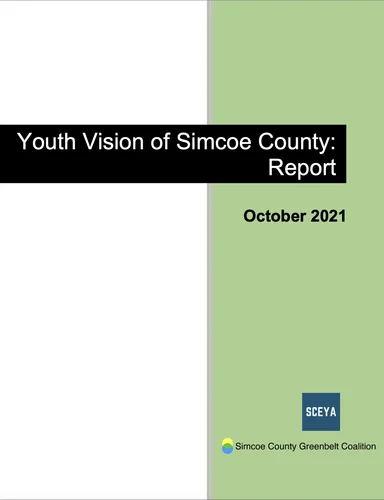Youth Vision of Simcoe County
Results from a survey conducted in the summer of 2021 asking youth in Simcoe County what they envision for the future.
One goal was to address a gap in the County’s Municipal Comprehensive Review engagement, which did not include voices of youth. The MCR is planning for the communities that today’s youth will inherit, after all.
Introduction
The Youth Vision of Simcoe County Survey was a collaboration between Simcoe County Greenbelt Coalition (SCGC) and Simcoe County Environmental Youth Alliance (SCEYA) over the summer and fall of 2021. The intention of the survey was to get an indication of where Simcoe County youth are at with regards to climate action, barriers to engaging in their communities, and their visions for the future of their communities.
This was an informal community survey to inform how local organizations can help eliminate barriers that youth are facing to engaging in community organizations, local government and climate action generally.
The results of this survey are not generalizable, nor is this intended to be a formal, academic study. The survey was promoted through social media, word of mouth and reaching out to community organizations, local libraries and schools.
The survey had 162 respondents. No contact information was collected from participants to ensure the anonymity of the youth who completed the survey.
Concerns & Barriers
We know that young people globally are facing severe mental health challenges because of the climate emergency, and according to more recent research1Young People’s Voices on Climate Anxiety, Government Betrayal and Moral Injury: A Global Phenomenon, these mental health challenges have been linked to government inaction.
Climate action must be part of addressing the mental health crisis that is impacting youth here in Simcoe County.
- 75% said that they were ‘very’ or ‘extremely’ concerned about climate change
- About half said that climate change is affecting their lives either ‘a lot’ or ‘a great deal’, with another third saying it is affecting their lives ‘a moderate amount’
Considering that Ontario is not even feeling the worst of the coming impacts of climate change yet2Canada in a Changing Climate: National Issues Report, this is particularly concerning. Young people are recognizing that the climate emergency is here, now.

Youth who were not involved in climate action often faced barriers to meaningful participation:
- About half of participants felt that participating in local decision making was ‘difficult’ or ‘very difficult’.
- Main barriers were identified as simply not enough time to engage, not knowing enough about local issues or local organizations, and not being able to find local organizations or lack of roles for youth in those organizations.
Priorities for Future Communities
In light of Simcoe County’s municipalities undergoing major planning decisions via Municipal Comprehensive Reviews (MCRs) at the time of the survey, we asked youth about some of their priorities regarding planning decisions:
- 83% of youth felt that designing communities in ways that protect local forests, wetlands and animal habitats was ‘very’ or ‘extremely important’.
- 70% of youth felt that changing the way Simcoe County plans to adapt to climate change was ‘very’ or ‘extremely’ important.
- 69% of youth felt that building what we need in existing communities to avoid expanding on to more land was ‘very’ or ‘extremely’ important.
- 68% of youth felt that it was ‘very’ or ‘extremely’ important that Simcoe County plans communities in ways that address social justice issues and climate change at the same time.
For municipalities in particular, meaningfully involving youth in planning processes can have co-benefits, including health outcomes and academic performance3Planning for Sustainable Happiness: Harmonizing Our Internal and External Landscapes. Rethinking Development: 2nd International Conference on Gross National Happiness.(PDF)4Planning for and with children and youth: insights from children about happiness, well-being and walking.(PDF).

We asked youth to rank the importance of different aspects of community life that reflect the Complete Communities envisioned in Ontario’s Growth Plan:
- 82% of youth ranked having different kinds of affordable housing available as ‘very’ or ‘extremely’ important;
- 48% identified being able to safely get places via active transportation as ‘very’ or ‘extremely’ important;
- 62% said that having essential services close to home was ‘very’ or ‘extremely’ important;
- 78% said that access to healthy, affordable food close to home was ‘very’ or ‘extremely’ important to them;
- 52% said that convenient public transit was ‘very’ or ‘extremely’ important;
- 65% identified having public spaces close to home was ‘very’ or ‘extremely’ important;
- 71% ranked having greenspaces and parks close to home as ‘very’ or ‘extremely’ important
This implies that the smart growth policies our municipalities should be pursuing to conform to the Growth Plan, lower carbon emissions and create affordable housing resonates with most young people.
Recommendations
Youth are concerned about the climate, want to see dramatic changes, and have a good understanding of many of the policy changes needed. This survey confirmed much of what we knew (Government of Canada, 2021), but gave some insights into where to engage local youth.
1. Meet youth where they are at.
Climate action should start where youth are at, both in terms of knowledge and experience, and literally where they are at: schools, clubs, youth organizations. Future partnerships and collaborations should attempt to include organizations/groups/institutions that are directed at youth or have youth programming, in addition to supporting youth-led organizations.
2. Educate the public, especially youth.
Linking the interconnections between local planning, local politics, community design, etc. with the broader narrative of climate change (that many youth already know and are wanting to act on), will likely make these local actions more relevant to youth.
This will empower them to feel like they can do something in response to their low confidence in local government. Making these connections is critical in tackling an emergency with such far reaching and intersectional impacts. Awareness around the interconnections between climate and other issues, such as housing, food security or health, can help residents better understand what local climate action can look like. The more connections made, the more options and opportunities for people with various backgrounds, interests and priorities to take action where they are, so that everyone in the community can move towards climate justice.
3. Link knowledge and awareness with action and advocacy.
We know from climate justice and climate education discourse that simply learning about or knowing about the impacts of climate change is not enough to move people to action. Action-oriented approaches that move from awareness to action bridge the gap and lessen feelings of apathy and distrust. Focusing resources on youth-led initiatives, roles and projects that are taken seriously is something that organizations and local governments would be wise to look into.
We hope that this project and any insights gained from it can help or motivate other organizations and local governments to build on these efforts to identify and eliminate barriers that youth face in engaging with their communities. Similarly, we recognize that a community survey is a small first step of what needs to be an ongoing process to create spaces for meaningful participation by youth in their communities, including decision making processes.


